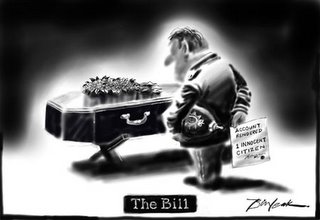U.S. Opposes U.N.'s Planned Rights Panel, Exclusion of Abusive Nations Sought UNITED NATIONS, Feb. 27 -- The Bush administration will oppose a U.N.-backed resolution calling for the creation of a council to expose the world's worst human rights abusers, John R. Bolton, the U.S. ambassador to the United Nations, said Monday.
UNITED NATIONS, Feb. 27 -- The Bush administration will oppose a U.N.-backed resolution calling for the creation of a council to expose the world's worst human rights abusers, John R. Bolton, the U.S. ambassador to the United Nations, said Monday.
Bolton said that a draft charter presented Thursday by the U.N. General Assembly president, Jan Eliasson, was not tough enough to ensure that nations that abuse human rights would be barred from joining the council. He said he was under instructions from Washington to reopen negotiations on the text or postpone deliberations on a new rights body for several months.
U.N. Secretary General Kofi Annan and other supporters of the compromise warned that there is no better deal to be struck and that the U.S. strategy could undermine their efforts to create an improved, though imperfect, human rights body. "I think we should not let the better be the enemy of the good," Annan told reporters Monday in Geneva.
The United States and the United Nations have been pressing for nearly a year to create a strengthened human rights council to replace the 53-member Human Rights Commission. The reputation of the Geneva-based panel, which helped draft the landmark Universal Declaration of Human Rights, has recently been tainted by the frequent election of members with dismal human rights records, such as Sudan and Zimbabwe.
Senior U.S. and U.N. officials had sought to prevent countries with poor rights records from joining the new organization by raising the membership standards and requiring a two-thirds vote of the 191-member General Assembly for any nation's admittance. But the proposal met stiff resistance, and the current draft resolution would require members to be elected by an absolute majority -- at least 96 countries.
"I say this really more in sorrow than in anger, but we're very disappointed with the draft that was produced last Thursday. We don't think it's acceptable," Bolton told reporters. "My understanding is that the president of the General Assembly intends to bring this matter to the General Assembly within a day or two for a vote. If he continues on that course, we will call for a vote and vote no."
Annan, U.N. Human Rights Commissioner Louise Arbour and two leading human rights organizations (Human Rights Watch and Amnesty International) say the compromise proposal is still worth supporting. They have been joined by former president Jimmy Carter and several other Nobel Prize winners, who issued a joint letter calling on the United States and other governments to back the deal. Annan, who discussed the human rights council Sunday with Secretary of State Condoleezza Rice, appealed Monday for the United States to "join the vast majority of governments who seem ready to accept" Eliasson's proposal. He and other supporters said the proposal constituted a serious improvement on the existing Human Rights Commission.
Annan, who discussed the human rights council Sunday with Secretary of State Condoleezza Rice, appealed Monday for the United States to "join the vast majority of governments who seem ready to accept" Eliasson's proposal. He and other supporters said the proposal constituted a serious improvement on the existing Human Rights Commission.
They noted that provisions to subject all council members to scrutiny of their human rights record would discourage countries with poor records from joining. They also said that council members suspected of abusive behavior can be suspended by a vote of two-thirds of the U.N. membership present.
"We are a country that puts high value on human rights. We wouldn't vote in favor if we weren't sure it was going to be an improvement," said Chile's U.N. ambassador, Heraldo Muñoz, a former dissident who was jailed under former Chilean ruler Augusto Pinochet.
The new council would consist of 47 members selected by secret ballot on the basis of "geographical distribution" and committed to "uphold the highest standards in the promotion and protection of human rights." Members would be elected for as many as two three-year terms at a time and would meet for at least 10 weeks throughout the year.
source
Tuesday, February 28, 2006
surprising, not ...
Posted by audacious at 28.2.06
Subscribe to:
Post Comments
(Atom)










































0 comments:
Post a Comment